The Super Series were exhibition ice hockey games between Soviet and North American teams from 1976 to 1991.
Super Series can also refer to:

The Canada Cup was an invitational international ice hockey tournament held on five occasions between 1976 and 1991. The brainchild of Toronto lawyer Alan Eagleson, the tournament was created to meet demand for a true world championship that allowed the best players from participating nations to compete regardless of their status as professional or amateur. It was sanctioned by the International Ice Hockey Federation, Hockey Canada and the National Hockey League. Canada won the tournament four times, while the Soviet Union captured the championship once. It was succeeded by the World Cup of Hockey in 1996.
The Summit Series, or Super Series, known at the time simply as the Canada–USSR Series, was an eight-game ice hockey series between the Soviet Union and Canada, held in September 1972. It was the first competition between the Soviet national team and a Canadian team represented by professional players of the National Hockey League (NHL), known as Team Canada. It was the first international ice hockey competition for Canada after they had withdrawn from such competitions in a dispute with the International Ice Hockey Federation (IIHF). The series was organized with the intention to create a true best-against-best competition in the sport of ice hockey. The Soviets had become the dominant team in international competitions, in which the Canadian professionals were ineligible to play. Canada had had a long history of dominance of the sport prior to the Soviets' rise.
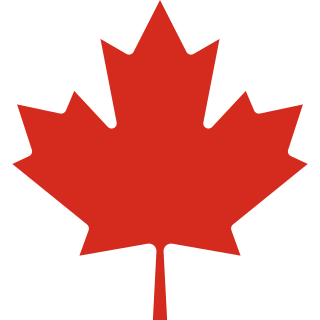
The Canada men's national ice hockey team is the ice hockey team representing Canada internationally. The team is overseen by Hockey Canada, a member of the International Ice Hockey Federation. From 1920 until 1963, Canada's international representation was by senior amateur club teams. Canada's national men's team was founded in 1963 by Father David Bauer as a part of the Canadian Amateur Hockey Association, playing out of the University of British Columbia. The nickname "Team Canada" was first used for the 1972 Summit Series and has been frequently used to refer to both the Canadian national men's and women's teams ever since.
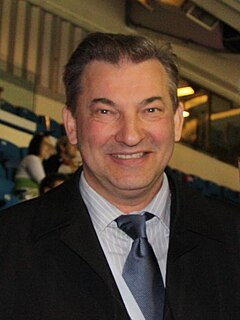
Vladislav Aleksandrovich Tretiak, MSM is a Russian former goaltender for the Soviet Union national ice hockey team. Considered to be one of the greatest goaltenders in the history of the sport, he was voted one of six players to the International Ice Hockey Federation's (IIHF) Centennial All-Star Team in a poll conducted by a group of 56 experts from 16 countries. He is the current president of the Ice Hockey Federation of Russia and was the general manager of the Russian 2010 Winter Olympic team.

Valeri Borisovich Kharlamov was an ice hockey forward who played for CSKA Moscow in the Soviet League from 1967 until his death in 1981. Although small in stature, Kharlamov was a speedy, intelligent, skilled and dominant player, being named the Soviet Championship League most valuable player in 1972 and 1973. An offensive player, who was considered very creative on the ice, he also led the league in scoring in 1972. He was also a gifted skater who was able to make plays at top speed. Kharlamov was considered one of the best players of his era, as well as one of the greatest players of all time.
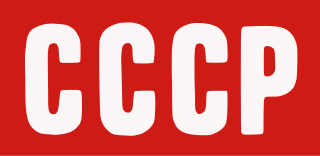
The Soviet national ice hockey team was the national men's ice hockey team of the Soviet Union. From 1954, the team won at least one medal each year at either the Ice Hockey World Championships or the Olympic hockey tournament.
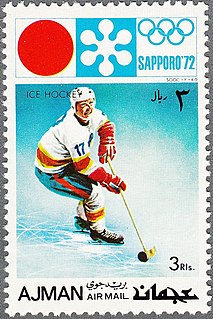
The men's ice hockey tournament at the 1972 Winter Olympics in Sapporo, Japan, was the 12th Olympic Championship. Games were held at the Makomanai Ice Arena and at the Tsukisamu Indoor Skating Rink. The Soviet Union won its fourth gold medal. The United States won the silver, while Czechoslovakia won the bronze. Canada did not send a team to the event for the first time since ice hockey was first competed at the Olympics in 1920, instead competing with and defeating the Soviets in a competition later that year known as the Summit Series. Canada would not send a men's hockey team to the Olympics until 1980.
The Summit Series was an eight-game series of ice hockey between the Soviet Union and Canada, held in September 1972.
The 1974 Summit Series was the second of two competitions between Soviet and Canadian professional ice hockey players, following the same format as the 1972 Summit Series, with four games across Canada and four in Moscow. The Soviet team won the series 4–1–3, with Canada's lone victory coming Maple Leaf Gardens in Toronto. A significant difference from the previous series was that Canada's roster was selected from the World Hockey Association instead of the National Hockey League.

Alexander Sergeyevich Yakushev is a former ice hockey player and coach for the Soviet Union.
Super Series '76 was the first of the "Super Series" ice hockey exhibitions, which saw club teams from Soviet Championship League touring North America to play against teams from the National Hockey League (NHL). The games were played in late December 1975 through the early part of January 1976, in the middle of the regular schedules of the NHL and Soviet league.
The Flyers–Red Army game was a famous international ice hockey game played on January 11, 1976, between the Philadelphia Flyers of the North America-based National Hockey League (NHL), and HC CSKA Moscow of the Soviet Union.
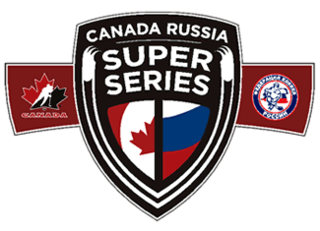
The 2007 Super Series was an eight-game Under-20 ice hockey challenge between Russia and Canada. The series was won by Canada, who shocked the Russians with seven wins and one tie. Over the course of the eight games, Canada outscored Russia 39-13. The Series was held from August 27 to September 9 in various venues in both countries. The event commemorated the 35th anniversary of the 1972 Summit Series between the USSR and Canada.
The following is a chronicle of events during the year 2007 in ice hockey.

The Canadian men's national under-20 ice hockey team is the ice hockey team representing Canada internationally in under-20 competition. Their primary participation in this age group comes at the International Ice Hockey Federation's World Junior Championship, held annually every December and January. The team also participates in various exhibition matches and occasional exhibition series, such as the 2007 Super Series against their Russian counterparts, an eight-game exhibition series commemorating the 35th anniversary of the 1972 Summit Series.

The Punch-up in Piestany was a bench-clearing brawl between Canada and the Soviet Union during the final game of the 1987 World Junior Ice Hockey Championships in Piešťany, Czechoslovakia on January 4, 1987. The incident resulted in the ejection of both nations, and while the Soviets had already been eliminated from medal contention, the disqualification cost Canada a medal – potentially the gold. The brawl is famous for officials having turned off the arena lights in a desperate attempt to end the 20-minute melee. Much of the blame was placed on Norwegian referee Hans Rønning, who had been selected for the game based on his perceived neutrality rather than experience.

Adolph Frank "Aggie" Kukulowicz was a Canadian professional ice hockey player and Russian-language interpreter. He played four games in the National Hockey League for the New York Rangers, then played 12 combined seasons in the minor leagues and senior ice hockey leagues. He won two Turner Cup championships with the St. Paul Saints in the International Hockey League, and was a 1964 Allan Cup champion with the Winnipeg Maroons. He was fluent in Russian and Polish, had a brief coaching career with GKS Katowice in Poland, and later worked as a European scout for the Philadelphia Flyers.

Andrei Vasilyevich Starovoytov was a Soviet ice hockey administrator, referee and player. He won three Soviet ice hockey championships as a player, and was later an ice hockey referee at eight World Championships. He was the general secretary of the Soviet Union Ice Hockey Federation for 17 years, and negotiated Soviet participation in the Summit Series. He was posthumously inducted into the IIHF Hall of Fame.
Vsevolod Vladimirovich Kukushkin is a Russian journalist, writer and ice hockey administrator. He has written for Komsomolskaya Pravda, TASS, RIA Novosti and Sport Express. He traveled with the Soviet Union national ice hockey team as both a journalist and translator, and reported on ice hockey at the Olympic Games, the Ice Hockey World Championships and Canada Cup tournaments. His other work includes published books and television screenplays. As an ice hockey administrator he sat on International Ice Hockey Federation (IIHF) committees, and acted as a press secretary for the Russian Superleague and its successor the Kontinental Hockey League. He received the Paul Loicq Award in 2000 from the IIHF for contributions to international ice hockey.